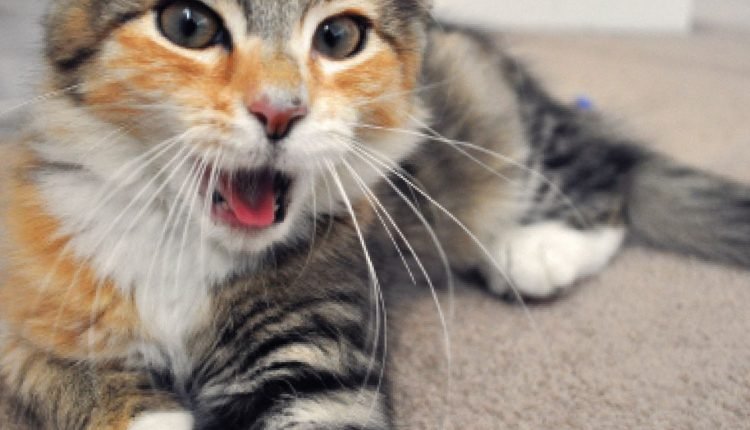[ad_1]
If there are many differences between cats and dogs, one of the most obvious is the way they breathe. Dogs breathe mainly with their mouths open, while cats generally breathe with their mouths closed. Since cats rarely do this, seeing a cat panting or breathing with its mouth open is something to watch out for. There are a few reasons a cat might be panting or have difficulty breathing – some benign and some not.
- Cats sometimes pant if they are playing too loudly. This is more common in cats, who run and wrestle and sometimes don’t know when to stop! While panting is not something to worry about, if you see it happening, calmly separate the cats, let them catch their breath and only watch them during future frantic play sessions.
- Cats tolerate heat well, but when it gets too hot, they may start to pant. An example would be when they are in a car or other enclosed space and cannot reach a cool, shaded place.
Humans have sweat glands all over their bodies, which allow for efficient heat dissipation. Cats have sweat glands on their paws and between their toes. This surface area is not sufficient to effectively regulate body temperature. To prevent it from overheating, pant, and the excess heat is dissipated by evaporation.
- Stress is another reason for cats. As a vet, I’ve seen this countless times. Cats are averse to travel, and they obviously don’t like being confined to a cat carrier. Several cats have come to my practice agitated and panting, and I have had to quickly sort them out to make sure the panting is only from stress and not from something more outrageous.
- Heart disease can cause difficulty breathing in cats. Cardiomyopathies (disorders of the heart muscle), unfortunately, are fairly common in cats. In many cases, these conditions progress slowly.
Cats, being adept at hiding signs of illness, may not reveal a problem until late in the game, when congestive heart failure begins to develop. Fluid may accumulate in and around a cat’s lungs, making it difficult to breathe. The respiratory rate increases, and although the cat may be outwardly at rest, the chest moves in and out significantly, giving the appearance of as if the cat has just ran around the block several times. Severely infected cats may breathe with their mouths open, which is a terrible sign.
Early intervention is critical if the cat is to recover. If you think your cat’s breathing may be difficult but aren’t quite sure, turn to the cautious side and have the cat checked right away.
- Respiratory disorders can also cause difficulty breathing in cats and are very common. The most common are viral upper respiratory infections (URIs) and often result in nasal secretions that obstruct airflow through the nostrils, making it difficult for cats to breathe. The difficulty breathing associated with URIs in general is not very worrisome, as it is caused by nasal and sinus congestion, not a lung disorder, which would be a greater concern. Nasal congestion from a URI tends to be noisy rather than straining, and it rarely causes cats to breathe with their mouths open.
However, I’ve had a few Persian-bred cats in my practice, with remarkably flat faces and exceptionally small nostrils, that got a URI, and these cats really paid the price. The nasal secretions completely blocked the nostrils, and they had to breathe with their mouths open. As we have noted, breathing with an open mouth is not normal for cats, and these kittens were miserable, barely able to sleep, until their colds were resolved.
Asthma is a very common respiratory disorder in cats and is very similar to asthma in humans. The airways of cats with asthma are highly reactive and may spontaneously constrict or narrow when exposed to certain substances or allergens. Cats with asthma develop increased mucus in the airways, airway inflammation, coughing, wheezing, and difficulty breathing.
Most cats come to the vet with a history of chronic coughing, but some cats present with severe, acute signs – wheezing, difficulty breathing, and sometimes panting or breathing with an open mouth, what is called an “asthma attack”. An asthma attack is a veterinary emergency that requires immediate care. Asthma tends to respond well to treatment with anti-inflammatory drugs (given by mouth or by specially designed inhalers) and bronchodilators (medicines that widen the airways).
Breathing with the mouth open does not come naturally to cats, and they find this annoying. If your cat is panting and common causes have been ruled out, or if you suspect that he is breathing more than usual, regardless of whether his mouth is open or not, his abnormal breathing pattern may be a sign of something more serious, and prompt veterinary care is necessary to determine the cause.
Panting vs. Tired Breathing: What to Look for
- The panting in cats is similar to the panting in dogs.
- Panting tends to be caused acutely by environmental factors, such as overheating, anxiety, or fatigue.
- Difficulty breathing (the medical term is shortness of breath) tends to develop slowly over time, sometimes for days or weeks.
- Difficult breathing may be a sign of a serious medical condition

Comments are closed, but trackbacks and pingbacks are open.